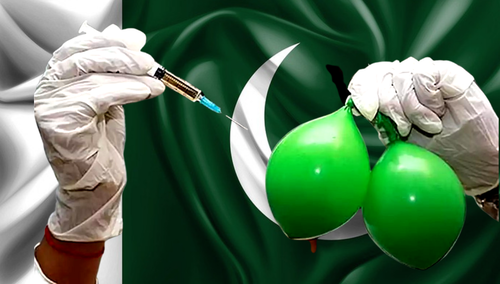Pakistan has adopted new measures against sexual assault that will ensure brisk trials and the chemical castration of offenders convicted in cases of rape.
The Anti-Rape Ordinance was signed into law Tuesday by Pakistani President Arif Alvi, and will ensure special courts meant to combat the crime will hear all rape cases, and wrap them up within four months, according to a statement from the president’s office.
Crisis cells will also be established that will conduct full-scale medical and legal examinations of rape victims within six hours of reported incidents, reports Anadolu Agency.
The new law will also establish a nationwide registry of repeat sex offenders.
Rape victims’ identities will also be protected, and those who reveal the identity of victims will face legal repercussions under the law.
Most controversially, repeat offenders will face chemical castration – a procedure that entails the use of drugs to lower testosterone levels and as a result, lower the sex drive of recidivist offenders.
The Cabinet approved the strict new measures last month following a spate of serious rape cases that drew national attention and caused an upswell of public outrage. The country has also seen unrest and riots in recent years in response to high-profile sex-abuse cases, including some involving minors.
In September, a mother was driving with her children along a major highway when she ran out of fuel and she was raped by two men while waiting for police to get her car started.
In Novemer, a mother and her daughter were also abducted in the southern Sindh province and forced to endure several days of rape at the hands of their kidnappers.
The ongoing crisis of rampant sexual assault has infuriated Prime Minister Imran Khan, who vowed to adopt draconian measures – including chemical castration – to halt the crisis of sexual assaults in the South Asian nation.
“I think he (the rapist) should be hanged publicly. Rapists and child molesters should have public hanging,” he told Hard Talk Pakistan in a September interview.
“You do not know the real statistics as well, because it’s under-reported. People do not report it due to being scared or ashamed, women are ashamed, no one wants to tell.”
However, Khan conceded that public hangings go against international human rights law and that the adoption of capital punishment would have an adverse effect on already-fraught relations with the west, and especially the country’s trade relationship with the European Union. Instead, he remarked that rapists and child molesters should “undergo chemical castration, or surgery be performed so they cannot do anything in future.”
Earlier this year, the lower house of Pakistan’s parliament passed a non-binding resolution calling for the public hanging of convicted child killers and rapists.
The resolution was swiftly condemned by government officials and human rights NGOs. Federal Minister for Science and Technology Fawad Chaudhry also condemned the passage of the resolution in a tweet that stated: “Strongly condemn this resolution. This is just another grave act in line with brutal civilisation practices [sic]. Societies [should] act in a balanced way, [barbarity] is not an answer to crimes. This is another expression of extremism.”
